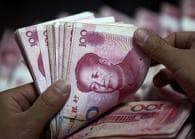
SINGAPORE (Nov 24): China is likely to cut interest rates again in the foreseeable future to boost credit demand and prevent an "over-correction" in its property market and investment sector, according to Citi.
The People's Bank of China surprised investors last Friday by lowering the one-year benchmark lending rate by 40 basis points to 5.6 percent and cutting the one-year deposit rate by 25 basis points to 2.75 percent.
The reductions, the first since July 2012, took effect from Nov 22.
"The rate cuts, together with another step in interest rate liberalization, may be offsetting the impact on deposit rates with each other, but it probably signals the beginning of the rate-cut cycle, as the targeted easing so far is not effective," Citi's Hong Kong-based analysts, led by Shen Minggao, wrote in a report.
"High cost of capital persisted this year mainly because of credit dislocation, raising the risk premium charged by lenders in a weak economy and falling inflation," they noted.
"More cuts are necessary to boost credit demand, not to stimulate the economy but to avoid over-correction in the property and investment sectors, and to ease the deflationary trend."
Sectors in China that will benefit from the rate cuts are property, utilities, insurance, railway construction, airlines and materials, according to Citi.
Its stock picks include Huadian, China East Air, Datang Power, GCL-Poly, China Ship, CN Railway Group, Fosun International, Sunac, CRLand and Ping An Insurance.
UBS expects another two rounds of rate cuts by end-2015.
"For a while now, the central bank has been adopting various 'targeted easing' measures to replenish interbank liquidity and lower money market rate and bond yields. However, these measures have had little impact on banks' lending rates, which are still largely priced off benchmark rates," UBS economist Tao Wang said in a note.
"As a result, real lending rates have remained high and increased again recently. A benchmark lending rate cut is the most direct and effective way to lower corporate borrowing costs," he said.
That said, the latest cut is not likely to lead to a significant increase in credit demand from Chinese companies, according to Tao.
"Corporate credit demand ... has been depressed by excess capacity and weak domestic demand, while credit supply has been controlled more by quantitative and prudential tools, which are only relaxed at the margin," he said.
"We continue to expect credit growth to slow in the coming year."